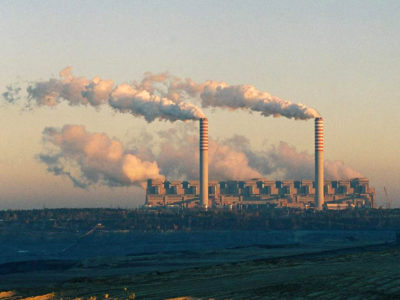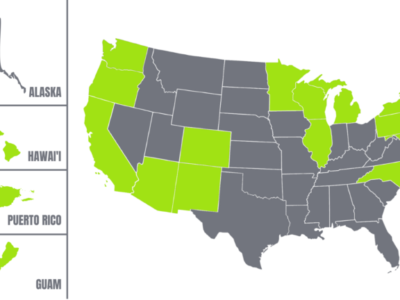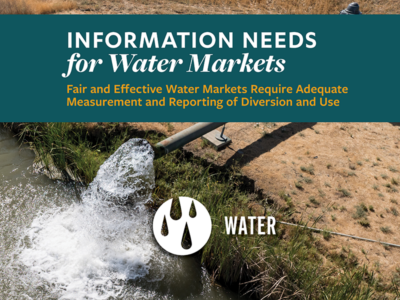Agriculture
Governors Lead the Fight on Forests and Climate
To see how governors are leading the fight against deforestation, look no further than a meeting happening this week in Brazil.
When the annual U.N. climate conference descends on the small Brazilian rainforest city of Belém in November 2025, it will be tempting to focus on the drama and disunity among major nations. Only 21 countries had even submitted their updated plans for managing climate change by the 2025 deadline required under the Paris Agreement. The U.S. is pulling out of …
Continue reading “Governors Lead the Fight on Forests and Climate”
CONTINUE READINGIs Brazil Ready for COP30? No One Is Ready for COP30
The Drain is a weekly roundup of climate and environmental news from Legal Planet.
It’s officially less than 6 months until COP30 — when tens of thousands of people will descend on the Brazilian city of Belém for the annual UN climate conference — and no one is ready. For one thing, Belém is an impoverished city of 2.5 million that can’t build enough hotels for the 50,000 expected delegates …
Continue reading “Is Brazil Ready for COP30? No One Is Ready for COP30”
CONTINUE READINGThe Legal Complexities of Deregulating Power Plant Carbon Emissions
The Supreme Court struck down Obama’s powerplant regulation. but it didn’t endorse Trump’s first try either.
We are likely to end up with a Trump rule for powerplant emissions that is much weaker than the Biden rule, but not as weak as EPA’s effort in the first Trump Administration. And the process will take Trump longer this time, with a greater litigation risk.This matters because even a very weak rule may require significant investments in improving powerplant efficiency, which could result in some plant closures.
CONTINUE READINGWhy I Still ♥ IRA
Biden’s climate law has already had a dramatic impact.
With over a half-trillion dollars in clean tech investment to date, the Inflation Reduction Act has left an indelible mark on U.S. climate policy. It’s unlikely that Congress will vote to repeal the whole law, given massive investments in GOP congressional districts. But even if they did, there’s no undoing the investments already made.
CONTINUE READINGA Disinformation Deluge on California Policies
Trump and House Republicans are trying to ‘flood the zone’ when it comes to wrongly blaming California environmental regulations for the LA fires.
Trump’s longtime strategy of ‘flooding the zone” — aka overwhelming opponents with a flurry of announcements and superficial initiatives — took a literal turn last week, when his administration ordered the release of a significant amount of water from two dams in the Central Valley to try to score political points. As the New York …
Continue reading “A Disinformation Deluge on California Policies”
CONTINUE READINGThe Green-State Playbook
Here are five ways states can save climate policy despite Trump.
Trump’s election is a body blow to U.S. climate policy, but there are ways that those states can fight Trump and move forward on their own plans. To cut to the chase, here are five key strategies for green states — starting with lawsuits against the Trump Administration, which were highly successful in Trump’s first term.
CONTINUE READINGLitigating Against Trump
Trump’s agencies had a terrible litigation record the first time. It will probably get better – but not that much better.
In his first term, Trump’s litigation record was awful – winning only one case in four by some estimates.The Trump folks should do a better this time. But they may not improve that much, and could still lose more often than they win. Money invested in litigating against the Administration will be well spent. Meticulous attention to evidence and legal requirements is likely to remain a weak point.
CONTINUE READINGGood & Bad Environmental News From the U.S. Supreme Court
Escalating Legal Attacks on California’s Longstanding Clean Air Act “Waiver” Authority
This past week, the U.S. Supreme Court issued important orders in two closely-related environmental cases previously decided by the U.S. Court of Appeals for the District of Columbia. Last Friday the justices granted review in Diamond Alternative Energy v. Environmental Protection Agency, agreeing to decide whether fossil fuel manufacturers have legal standing to challenge an …
Continue reading “Good & Bad Environmental News From the U.S. Supreme Court”
CONTINUE READINGNew This Thanksgiving: Toxic Turkey
Losing the farm to PFAS, or losing PFAS on the farm?
As Americans gather to celebrate the harvest’s bounty, there are few revelations about our food supply more distressing than the 2024 news that sewage-derived fertilizer has contaminated millions of acres of U.S. cropland with toxic PFAS chemicals. Marketed as “biosolids” that enhance soil productivity, the voluminous outputs from wastewater treatment plants have poisoned productive lands …
Continue reading “New This Thanksgiving: Toxic Turkey”
CONTINUE READINGMeeting information needs for water markets: Understanding water diversion and use
New CLEE report examines a prerequisite for fair and effective water markets
by Nell Green Nylen and Molly Bruce Water scarcity is a growing problem for agriculture and ecosystems across the U.S. Southwest. In many areas, unsustainable water use has overstretched local water supplies, and climate change is making these supplies more volatile. Water markets have the potential to enhance climate resilience by helping water users adapt …
CONTINUE READING












